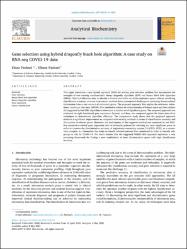| dc.contributor.author | Pashaei, Elnaz | |
| dc.contributor.author | Pashaei, Elham | |
| dc.date.accessioned | 2023-07-23T08:46:34Z | |
| dc.date.available | 2023-07-23T08:46:34Z | |
| dc.date.issued | 2021 | en_US |
| dc.identifier.issn | 0003-2697 | |
| dc.identifier.issn | 1096-0309 | |
| dc.identifier.uri | https://hdl.handle.net/11363/5076 | |
| dc.description.abstract | This paper introduces a new hybrid approach (DBH) for solving gene selection problem that incorporates the
strengths of two existing metaheuristics: binary dragonfly algorithm (BDF) and binary black hole algorithm
(BBHA). This hybridization aims to identify a limited and stable set of discriminative genes without sacrificing
classification accuracy, whereas most current methods have encountered challenges in extracting disease-related
information from a vast amount of redundant genes. The proposed approach first applies the minimum redundancy maximum relevancy (MRMR) filter method to reduce the dimensionality of feature space and then utilizes
the suggested hybrid DBH algorithm to determine a smaller set of significant genes. The proposed approach was
evaluated on eight benchmark gene expression datasets, and then, was compared against the latest state-of-art
techniques to demonstrate algorithm efficiency. The comparative study shows that the proposed approach
achieves a significant improvement as compared with existing methods in terms of classification accuracy and
the number of selected genes. Moreover, the performance of the suggested method was examined on real RNASeq coronavirus-related gene expression data of asthmatic patients for selecting the most significant genes in
order to improve the discriminative accuracy of angiotensin-converting enzyme 2 (ACE2). ACE2, as a coronavirus receptor, is a biomarker that helps to classify infected patients from uninfected in order to identify subgroups at risk for COVID-19. The result denotes that the suggested MRMR-DBH approach represents a very
promising framework for finding a new combination of most discriminative genes with high classification
accuracy. | en_US |
| dc.language.iso | eng | en_US |
| dc.publisher | ACADEMIC PRESS INC ELSEVIER SCIENCE, 525 B ST, STE 1900, SAN DIEGO, CA 92101-4495 | en_US |
| dc.relation.isversionof | 10.1016/j.ab.2021.114242 | en_US |
| dc.rights | info:eu-repo/semantics/openAccess | en_US |
| dc.rights | Attribution-NonCommercial-NoDerivs 3.0 United States | * |
| dc.rights.uri | http://creativecommons.org/licenses/by-nc-nd/3.0/us/ | * |
| dc.subject | Gene selection | en_US |
| dc.subject | Binary black hole algorithm | en_US |
| dc.subject | Binary dragonfly algorithm | en_US |
| dc.subject | Gene expression | en_US |
| dc.subject | Cancer classification | en_US |
| dc.title | Gene selection using hybrid dragonfly black hole algorithm: A case study on RNA-seq COVID-19 data | en_US |
| dc.type | article | en_US |
| dc.relation.ispartof | Analytical Biochemistry | en_US |
| dc.department | Mühendislik ve Mimarlık Fakültesi | en_US |
| dc.authorid | https://orcid.org/0000-0001-9391-9785 | en_US |
| dc.authorid | https://orcid.org/0000-0001-7401-4964 | en_US |
| dc.identifier.volume | 627 | en_US |
| dc.identifier.startpage | 1 | en_US |
| dc.identifier.endpage | 22 | en_US |
| dc.relation.publicationcategory | Makale - Uluslararası Hakemli Dergi - Kurum Öğretim Elemanı | en_US |
| dc.institutionauthor | Pashaei, Elham | |



















